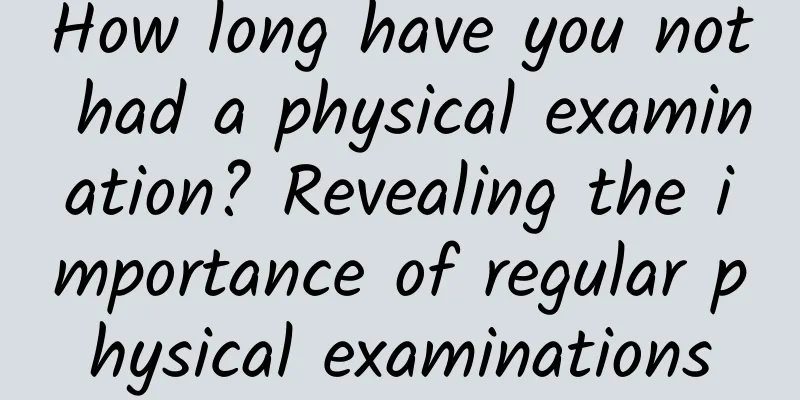How long have you not had a physical examination? Revealing the importance of regular physical examinations

|
In the busy pace of life, we often neglect our most precious asset, our health. Work, family and personal pursuits continue to occupy our time and energy, but we neglect to pay attention to our physical condition. Have you ever thought about how long it has been since you had a comprehensive physical examination? This article will explore the necessity of regular physical examinations and how it can be a guardian angel to maintain health. 1. What is a regular physical examination? Regular physical examinations are comprehensive physical examinations conducted at a certain time period (such as every year, every six months or every quarter) to detect potential health problems at an early stage and to intervene and treat them in a timely manner. Physical examinations usually include blood tests, urine tests, imaging tests (such as X-rays, B-ultrasound, CT, etc.), electrocardiograms, physical examinations, etc. 2. Why do you need regular physical examinations? 1. Detect problems early: Some diseases may not have obvious symptoms in the early stages. Physical examinations can detect and treat them in time, greatly improving the cure rate. 2. Monitor health status: Physical examinations can help individuals understand their health status and conduct long-term monitoring of indicators such as blood pressure, blood sugar, and cholesterol. 3. Disease prevention: Knowing your own health status will help you take appropriate lifestyle and dietary adjustments to prevent the occurrence of diseases. 4. Psychological comfort: Good physical examination results can bring people a sense of security and reduce the anxiety and stress caused by health concerns. 3. Which groups of people are suitable for regular physical examinations? Almost all adults should have regular physical examinations, especially the following: 1. Middle-aged and elderly people: As age increases, the risk of disease gradually increases. 2. Patients with chronic diseases: such as hypertension and diabetes, need to monitor their condition regularly. 3. People with a family history of disease: People with a family history of genetic diseases should pay more attention to relevant examinations. 4. Occupationally exposed population: such as workers who come into contact with hazardous substances. 5. People with bad living habits: such as long-term smoking, drinking, high-fat diet, etc. 4. How often should regular physical examinations be conducted? The frequency of physical examinations should be determined based on individual age, gender, health status, family medical history, etc. Generally speaking, young and healthy adults can have a basic physical examination every two years; middle-aged and elderly people or patients with chronic diseases are recommended to have a comprehensive physical examination at least once a year. 5. What should you pay attention to during regular physical examinations? 1. Choose a regular medical institution: to ensure the accuracy and reliability of the examination results. 2. Make an appointment in advance: avoid waiting in line and save time. 3. Fasting examination: Some examination items such as blood sugar and blood lipids need to be performed on an empty stomach. 4. Comfortable to wear: convenient for changing clothes and conducting various inspections. 5. Bring your past medical records: This will help doctors better understand your historical health status. Conclusion: Health is the foundation of everything, and regular physical examinations are an important means to maintain this foundation. No matter how busy you are, you should take time to care about your physical condition and have a physical examination in time. Remember, prevention is better than cure, and don't wait until your body sends out warning signals before taking action. Now, check your schedule and set aside time for the next physical examination! |
Recommend
What is the best way to treat premature ovarian failure?
Nowadays, many women do not take good care of the...
Can bananas cure constipation? The fruit that really relieves constipation is...
If you average a week Fewer than 3 bowel movement...
Is scalp pain also considered a headache?
This is the 4254th article of Da Yi Xiao Hu Xiao ...
Can I have sex before hysteroscopy?
Hysteroscopy and laparoscopy are a method to help...
Why do steamed buns collapse? How to make the dough soft and delicious?
During the epidemic, many people were quarantined...
Laser treatment of cervical erosion
I believe everyone is familiar with the disease o...
Urine test after abortion is very weakly positive
Many women will find that their urine test result...
Why do some people have high hcg levels during pregnancy?
Everyone has a different physique, and the body&#...
What gynecological diseases can be seen by taking the pulse
Gynecological inflammation mainly refers to infla...
Bleeding on the third day after miscarriage
Women's physical condition is usually not so ...
What should I do if I am afraid of cold and wind after giving birth?
If postpartum care is not in place, the mother wi...
What causes abdominal pain during pregnancy?
During pregnancy, a woman's body will undergo...
Can I drink Tieguanyin tea during menstruation?
Tieguanyin tea is a kind of tea that many people ...
Fun story: How to slow down skin aging?
Oftentimes, we talk about the traces of time, and...









